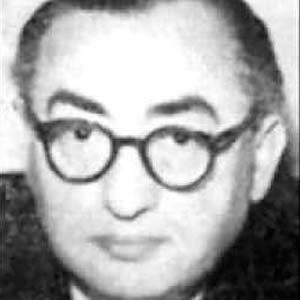A writer, poet and teacher of Yiddish literature, Shpigl grew up in Łódź where he received a traditional education, going on to study in a public school. Later he taught Yiddish and Yiddish literature at the Bund’s Yiddish schools, remaining in the Łódź ghetto throughout its existence. From 1940 until the ghetto’s liquidation in August 1944, Shpigl was employed in various departments of the Judenrat (Jewish Council). In August 1944 he was deported to Auschwitz and spent the rest of the war in a number of different labour camps.
Shpigl’s first Yiddish poems were published in 1922, and in 1930 his first book of poetry appeared in print, Mitn Punim tsu der Zun (Facing the Sun). His second book of poems was ready for publication on the eve of World War Two. That, as well as a collection of stories about the Jewish weavers in the slum quarter where he had grown up, and Yiddish translations of a variety of other works, were subsequently lost.
Shpigl was one of the most prolific and important writers in the ghetto and composed many short stories and poems during his time there. One of two poems set to music by Dovid Beyglman and performed in the ghetto theatre – ‘Makh tsu di eygelekh’ (Close your eyes) – was performed in the presence of Khayim Rumkowski, the Judenrat chairman. It proved too shocking for Rumkowski, who promptly ordered that Shpigl be driven out of the ghetto lest the inmates become too demoralised.
When the ghetto was liquidated in August 1944, Shpigl hid some of his writings in a cellar and took the rest with him to Auschwitz. Astonishingly, after the Liberation he returned to Łódź, and found the manuscripts of sixteen of the stories he had hidden there. He reconstructed the rest from memory and published them alongside others he had composed during the war.
Shpigl’s ghetto writings reflect his most acute concerns: the lack of contact with the world outside and the absence of an armed resistance movement in the ghetto. His stories deal with the inner life of ghetto inmates as well as the relationships between them, and he describes their hunger and suffering very vividly.
Shpigl returned to Łódź after his liberation, living there from 1945 to 1948. He then moved to Warsaw and lived there until 1950. From 1950 until his death he lived in Israel, all the while continuing to write in Yiddish.


10 thoughts on “Kaminos”
Was Nicholas related to Alexander Saslavsky who married Celeste Izolee Todd?
Anyone have a contact email for Yair Klinger or link to score for Ha-Bayta?
wish to have homeland concert video played on the big screen throughout North America.
can organize here in Santa Barbara California.
contacts for this needed and any ideas or suggestions welcomed.
Nat farber is my great grandpa 😊
Are there any movies or photos of max kletter? His wife’s sister was my stepmother, so I’m interested in seeing them and sharing them with his wife’s daughter.
The article says Sheb recorded his last song just 4 days before he died, but does not tell us the name of it. I be curious what it was. I’d like to hear it.
Would anyone happen to know where I can find a copy of the sheet music for a Gil Aldema Choral (SATB) arrangement for Naomi Shemer’s “Sheleg Al Iri”. (Snow on my Village)?
Joseph Smith
Kol Ram Community Choir, NYC
שלום שמעון!
לא שכחתי אותך. עזבתי את ישראל בפברואר 1998 כדי להביא את בני האוטיסט לקבל את העזרה המקצועית שלא הייתה קיימת אז בישראל. זה סיפור מאוד עצוב וטרגי, אבל אני הייתי היחיד עם ביצים שהביא אותו והייתי הורה יחיד בשבילו במשך חמישה חודשים. הוא היה אז בן 9. כעת הוא בן 36 ומתפקד באופן עצמאי. נתתי לו הזדמנות לעתיד נורמלי. בטח, אבות כולם חרא, אומרים הפמינציות, אבל כולם צריכים לעבוד כמטרות במטווחי רובה!
משה קונג
(Maurice King)
Thank you for this wonderful remembrance of Herman Zalis. My late father, Henry Wahrman, was one of his students. Note the correct spelling of his name for future reference. Thank you again for sharing this.
Tirza Wahrman (Mitlak)
amazing zchuso yagein aleinu, he wrote the famous niggun Lefichuch that is sung in almost every Israeli Yeshiva